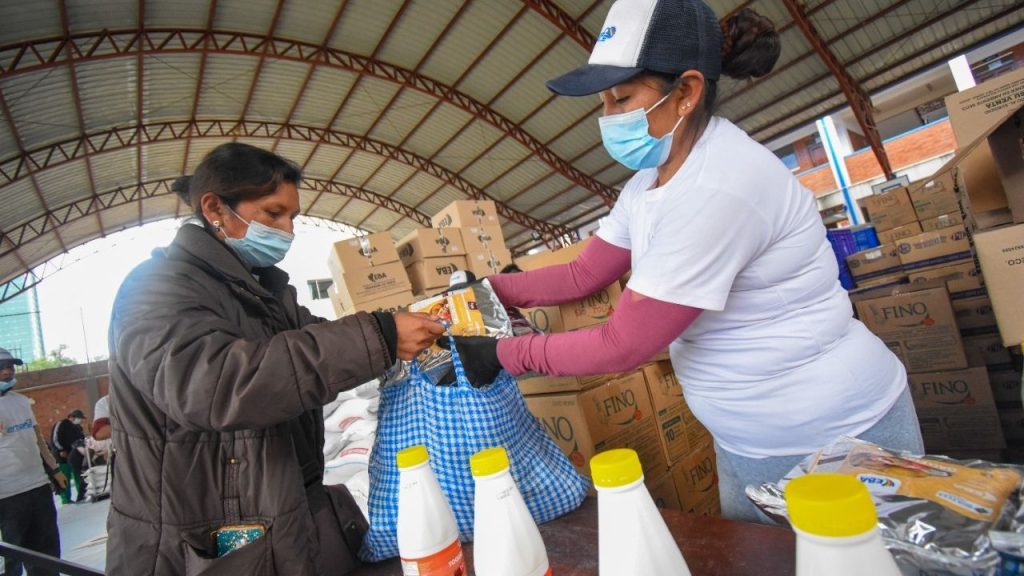Of all the products produced by the Sancti Spíritus industry, only one has complied with the monthly plan for the basic basket: Osito compote, a preparation that is distributed to children up to three years of age despite having a significant amount of added sugars, a component that is not considered appropriate for those ages.
The product is manufactured by the provincial plant of the Food and Beverages company La Estancia, which was awarded just five days ago for producing and marketing juices and nectars “in modern cardboard containers with a unique technology in the nation” and complying with “the requirements of the Codex Alimentarius, which is part of the Joint Program of the Food and Agriculture Organization of the United Nations and the World Health Organization “, according to the official press.
The Osito compote that is distributed in the basket is sold in 200 ml containers and is made with fruit pulp, water, sugar, starch, citric acid, vitamin C and iron lactate. According to the nutritional information released by the company, the preparation does not have preservatives, artificial colors or flavors, but it does have between 10 and 12 grams of sucrose.
The Osito compote that is distributed in the basket is sold in 200 ml containers and is made with fruit pulp, water, sugar, starch, citric acid, vitamin C and iron lactate.
“Most of us believe that the only type of sugar is the sugar that we find on the table, that is, refined sugar, but the famous added sugars have different types of names that we do not recognize, such as sucrose, glucose polymers, maltodextrin, cornstarch , glucose syrup and dextrose, it is very important to begin to recognize these types of sweeteners in the products we buy if we want to make healthy decisions, “says Ingrid Jiménez, a Colombian child nutritionist.
In 2019, the WHO called on the international community to eliminate sugars in baby food. According to their studies, the consumption of this additive, which is also excessive, stimulates a preference for sweets at an early age, with negative results in overweight and obesity, diabetes or cardiovascular problems.
The American Heart Association warned of precisely this extreme, warning that there is “strong evidence linking added sugars with an increased risk of cardiovascular disease in children.” Since then, its official position has been to ask that any sugar consumption be avoided for children under two years of age.
Between two and three years of age, children should not ingest more than 15 grams a day of this ingredient, adds the association, an amount that is almost covered with one of these compotes and that thousands of babies in Cuba are consuming in contradiction with the criteria of medical associations.
The WHO established that no infant product that adds sugar should be consumed by infants and children under 3 years of age. This does not apply to the sugars derived from the fruit, which in the case of Osito compote are between 8 and 10 grams, but it does apply to the famous sucrose, present in the diet of Cuban minors with the placet of the Ministry of Public Health .
“I don’t know anyone who gives compotes to newborns,” says a housewife from Centro Habana. “My children did not take them until after a year and a half, I would even dare to swear longer”
However, there are many pediatricians on the Island who advise against giving this product. “I don’t know anyone who gives compotes to newborns,” says a housewife from Centro Habana. “My children did not take them until after a year and a half, I would even dare to swear longer.” And he asserts: “Those compotes make children sick to their stomachs.”
“There are people who keep it, but in most cases, they either sell it or leave it to the older children at home,” a neighbor of the lady agrees.
The Osito compote factory has been complying with the plan established by the State for two years without problems, although in mid-2019 it was warned that the shortage of raw materials could affect deliveries. Cuban consumers have welcomed both the successes and the failures of the product with anger, as they fear its lack or consider the regulated quantity (seven compotes a month) little without being aware of the harmfulness of sugars for health, in particular for the minors.
Smearing the tete with sugar, putting honey on the baby’s lips to calm him down, adding sweeteners to milk from the earliest childhood and other practices of this type are still a constant in Cuban homes where sugar is still seen as a food with high nutritional values.
In the country that was once “the world’s sugar factory”, about two kilograms per capita of the product are distributed on a monthly basis through the rationed market. Added to this are the numerous recipes for syrupy sweets, puddings, puddings, custards and candies that are consumed every day in the houses of the Island.
Despite the fact that the Ministry of Public Health itself recognized that at the end of 2020 diabetes mellitus It had a prevalence of 66.9 per thousand inhabitants, there is no official media campaign focused on reducing the consumption of sugars. Sweet foods are favored in school canteens, kindergartens and fairs organized by the State.
With the subsidized distribution of sugar, the Cuban government manages to complete the daily caloric requirements that the FAO (Food and Agriculture Organization of the United Nations) ensures that each person ensures that their body remains healthy and can carry out its functions.
________________________
Collaborate with our work:
The team of 14ymedio He is committed to doing serious journalism that reflects the reality of deep Cuba. Thank you for joining us on this long road. We invite you to continue supporting us, but this time becoming a member of our journal. Together we can continue transforming journalism in Cuba.

















